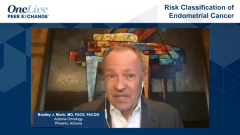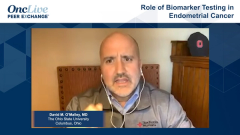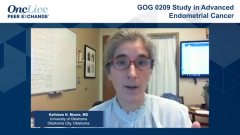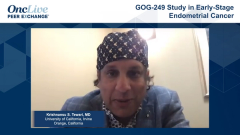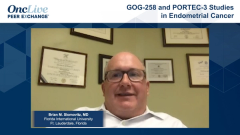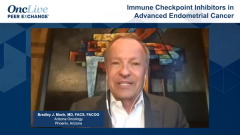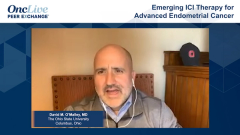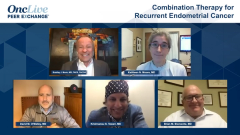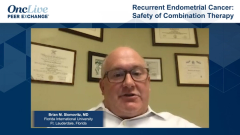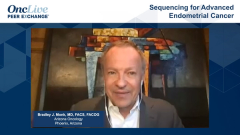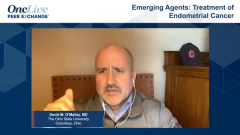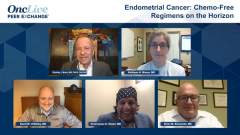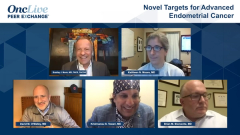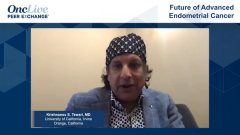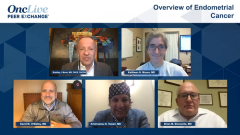
Emerging Agents: Treatment of Endometrial Cancer
Episodes in this series

Bradley J. Monk, MD, FACS, FACOG: I want to talk about some of the large phase 3 trials. Probably the first to report will be the proof-of-principle concept for the accelerated approval of pembrolizumab-lenvatinib, which is called KEYNOTE-775. Why don’t you go ahead and tell us about that, Dave?
David M. O’Malley, MD: Yes, we just mentioned 1 of the options for beyond second-line therapy, beyond carboplatin-paclitaxel. This is looking at 1-on-1 randomization in that second, above a group of patients, looking at lenvatinib-pembrolizumab vs weekly paclitaxel or doxorubicin. These are the 2 standard-of-care arms. Standard of care vs lenvatinib-pembrolizumab. The 2 options are doxorubicin—or weekly paclitaxel. That should hopefully read out in the next year or so. We look forward to seeing those results.
Bradley J. Monk, MD, FACS, FACOG: Yes, the good news is that this will give a global opportunity. We have the accelerated approval in the United States, but pembrolizumab and lenvatinib is not available internationally. Not only will this convert the accelerated approval potentially to full approval in the United States, but it will give an international opportunity. I’m very excited about that. We’re trying to add checkpoint inhibitors frontline. We talked about the NRG-GY018 trial, which adds pembrolizumab to chemotherapy. Brian, I know you’re trying to add dostarlimab to frontline chemotherapy. Tell me about RUBY.
Brian M. Slomovitz, MD: Yes. In the RUBY trial, which is an ENGOT [European Network of Gynaecological Oncological Trials]–GOG [Gynecologic Oncology Group] initiative, we’re using carboplatin and paclitaxel as the standard-of-care arm. Patients are randomized to placebo vs addition of dostarlimab. A nice thing about this trial is it includes carcinosarcomas. We haven’t focused a lot on that, but carcinosarcomas are in the realm of advanced breast and endometrial cancers. We need better treatment options for them. They’re likely to respond to immunotherapy. We’re well on our way. We’re accruing nicely to that trial. Those results may—if it’s a positive trial, we may add dostarlimab to the frontline therapy.
Bradley J. Monk, MD, FACS, FACOG: Think of this: We’ve got pembrolizumab in the frontline and dostarlimab in frontline. Now Katie Moore, you’re mentoring Dr Shannon Westin from The University of Texas MD Anderson Cancer Center with durvalumab. It’s so exciting. The endometrial space is so robust. Tell us about the study that you call DUO-E.
Kathleen N. Moore, MD: DUO-E is the best trial. The trial has paclitaxel-carboplatin vs paclitaxel-carboplatin with durvalumab and durvalumab maintenance versus paclitaxel-carboplatin-durvalumab in the durvalumab-olaparib maintenance. It’s incorporating a PARP inhibitor with an immune checkpoint inhibitor into the maintenance setting for advanced endometrial cancer. Of course, this is stratified by MSI-H [microsatellite instability high]. This is open globally and accruing quite well.
There are some early data coming out of NRG Oncology that probably the benefit is going to be in combinations. Endometrial cancer, for the most part, does not have the HRD [homologous recombination deficiency] signature that we think of in ovarian cancer. We’re going to see a lot of single-agent activity. But in combinations, it does appear to be active. Dr Westin has led a lot of those studies out of MD Anderson. The PARP inhibitor story is an interesting 1 in endometrial cancer in understanding that the biomarkers for relevant combination are going to be key. This will be a big opportunity for us to see if the patients do better with the combination.
Bradley J. Monk, MD, FACS, FACOG: That’s very exciting. Krish, again, you’re our big advocate of anti-VEGF I/O [immuno-oncology]. Tell us about this cabozantinib-nivolumab opportunity.
Krishnansu S. Tewari, MD: We just heard about this at the virtual ASCO [American Society of Clinical Oncology 2020 Annual Meeting]. This was an interesting study because it’s combining a VEGF receptor to inhibitor cabozantinib with nivolumab vs nivolumab alone. Then they also have this other cohort—we were talking about carcinosarcoma. They had about 9 or 10 women with carcinosarcoma. The combination was exciting because more than half the patients had 3 or more prior lines of therapy. Median PFS [progression-free survival] for the combo was about 6 months versus 2 months with the nivolumab alone. Even among the carcinosarcomas, 6 or 7 of these 9 patients had had prior I/O, and all 6 of those patients had partial responses [PRs]. It’s an exciting combination, and it deserves a further look.
Bradley J. Monk, MD, FACS, FACOG: You’ve got I/O plus VEGF. KEYNOTE-775 second line, LEAP-001 frontline, cabozantinib-nivolumab—unbelievable. Three studies. Then we add chemotherapy to I/O, in RUBY. Right? And NRG-GY018. Then Katie Moore and the group are adding PARP inhibitors. What a wonderful opportunity for combinations: VEGF, chemotherapy, and PARP. Go ahead, Brian.
Brian M. Slomovitz, MD: Yes, I know you mentioned LEAP in the first line. Just to be complete, there’s also, in Europe, the AtTEnd trial, which is a RUBY with carboplatin-paclitaxel plus or minus atezolizumab. One of the things we’re really excited about is we’re finally doing an I/O adjuvant trial in the advanced stage. This is available for public consumption. We’re going to enroll 990 patients. For those patients with advanced TP53-positive stage I or II disease or stage III or IV disease with no measurable disease, carboplatin and paclitaxel plus or minus pembrolizumab. We’re looking at it in the advanced measurable setting, and now the GOG is going to be doing this study with ENGOT in the advanced adjuvant setting. Those patients can get radiation based on clinician discretion while they’re still in the trials.
Bradley J. Monk, MD, FACS, FACOG: Yes. KEYNOTE-B21 is listed on clinicaltrials.gov. Thank you. Incidentally, Brian, Dr Slomovitz is the GOG partners endometrial cancer lead and is a passionate advocate for all these studies.
Transcript Edited for Clarity


